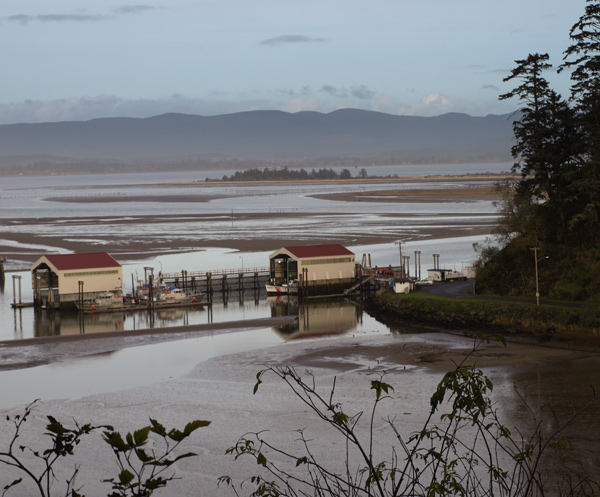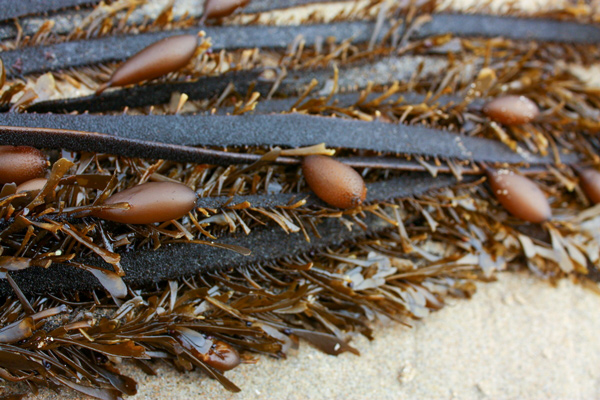Having visited Cape Disappointment without finding ships, Lewis returns to Station Camp. Clark trades with some Chinooks and gathers volunteers to visit the Pacific Ocean tomorrow. Lewis adds feather boa kelp to his plant collection.
Return from Cape Disappointment
by Yellowstone Public Radio[1]Originally aired weekdays by Yellowstone Public Radio during the Bicentennial observance of 2003-2006. Narrated by Hal Hansen. Scripts by Whit Hansen and Ed Jacobson. Produced by Leni Holliman. © … Continue reading
Cape Disappointment
The Empty Anchorage
© 10 November 2008 by Kristopher K. Townsend. Permission to use granted under the Creative Commons Attribution-Share Alike 4.0 International license.
Breaking Waves
a fair cool morning wind from the East. The tide rises at this place 8 feet 6 inches and comes in with great waves brakeing on the Sand beech on which we lay with great fury
—William Clark
Return from Cape Disappointment
Capt. Lewis and party returned to Camp also, and informed us that they had been about 30 miles down which took them on the Sea Shore and a verry bad road the most of the way. they Saw the harbour where the vessells had lain but they were all gone.—
—John Ordway
Chinook Traders
those Chinnooks [Chinooks] made us a present of a rute boiled much resembling the common liquorice in taste and Size: [ML?: thy call cul-wha-mo] in return for this root we gave more than double the value to Satisfy their craveing dispostn. It is a bad practice to receive a present from those Indians as they are never Satisfied for that they reive in return if ten time the value of the articles they gave.
—William Clark
The Chinook Nation
The Chief of the nation below us Came up to See us the name of the nation is Chin-nook and is noumerous live principally on fish roots a fiew Elk and fowls. they are well armed with good Fusees.
—William Clark
Clark’s Volunteers
I directed all the men who wished to See more of the Ocean to Get ready to Set out with me on tomorrow day light. the following men expressed a wish to accompany me i’e’ Serj. Nat Pryor Serjt. J. Ordway, Jo: Fields R. Fields, Jo. Shannon, Jo[hn] Colter, William Bratten [Bratton], Peter Wiser [Weiser], Shabono [Charbonneau] & my Servant York. all others being well Contented with what part of the Ocean & its curiosities which Could be Seen from the vicinity of our Camp.
—William Clark
Feather Boa Kelp Specimen
Fucus From the mouth of the Columbia River on the Pacific Ocean. Novb: 17th 1805
—Meriwether Lewis[2]Egregia menziesii,. Moulton, ed. Herbarium, specimen 59.
Weather Diary
Day of the month Wind State of the Weather 17th E cloudy after fair —Meriwether Lewis[3]Some abbreviations have been spelled out.
Middle Village-Station Camp is a High Potential Historic Site along the Lewis and Clark National Historic Trail managed by the U.S. National Park Service. The site provides interpretation and is part of the Lewis and Clark National and State Historical Parks.
Notes
| ↑1 | Originally aired weekdays by Yellowstone Public Radio during the Bicentennial observance of 2003-2006. Narrated by Hal Hansen. Scripts by Whit Hansen and Ed Jacobson. Produced by Leni Holliman. © 2003 by Yellowstone Public Radio. |
|---|---|
| ↑2 | Egregia menziesii,. Moulton, ed. Herbarium, specimen 59. |
| ↑3 | Some abbreviations have been spelled out. |
Experience the Lewis and Clark Trail
The Lewis and Clark Trail Experience—our sister site at lewisandclark.travel—connects the world to people and places on the Lewis and Clark Trail.
Discover More
- The Lewis and Clark Expedition: Day by Day by Gary E. Moulton (University of Nebraska Press, 2018). The story in prose, 14 May 1804–23 September 1806.
- The Lewis and Clark Journals: An American Epic of Discovery (abridged) by Gary E. Moulton (University of Nebraska Press, 2003). Selected journal excerpts, 14 May 1804–23 September 1806.
- The Lewis and Clark Journals. by Gary E. Moulton (University of Nebraska Press, 1983–2001). The complete story in 13 volumes.





